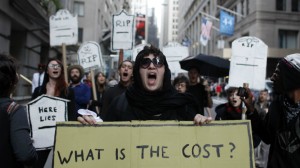This article was written in response to Greg Burr’s opinion piece “The Real Libertarians of Ewing Township,” published on March 20.
By Vincent Aldazzabal
Greg Burr’s articulate, passionate and concise defense of free market principles is a noble one. However it is my assertion that Mr. Burr’s rebuttal to Mr. Werner’s piece may lack an understanding of economics as a branch of history, and severely underplays the fact that many free market practices have come at the cost of infringing on the very civil and human rights that Mr. Burr claims to adamantly defend. Such a stance provokes a more transparent look into the role of free markets in American domestic and foreign policy.
I seek to show that there is overwhelming evidence that unregulated free market practice have dominated the discourse of American policy at home and abroad, especially since World War II. More importantly, while Burr condemns presumably most — if not all — forms of government regulation in the free market, he refuses to see the immense role that corporate influence has played in restricting and perverting the very democracy he defends. For instance, it is highly visible that the voice of the individual citizen has come second to the power of corporate interest and, in effect, the unlimited capacity for the wealthy to endlessly finance attack ads and other propaganda mechanisms.

Now, Mr. Burr fairly asks the question: where is there convincing evidence of harm from free markets? Of course, it would be absurd to claim that the theoretical models themselves are harmful. While Mr. Burr makes a most subjective argument that free markets are the best we have to offer, it operates under the false pretense that they are innately superior — a static representation — and never succumbing to the negative influences of “Big Brother,” socialism, and communism. While Mr. Burr admirably defends the credibility of economic models treasured by academics, he overlooks the consistent recklessness of many free market practitioners.
Last year, according to the Center for Disease Control and Prevention, close to 50,000,000 Americans were not granted health insurance because a corporately bought Congress and health insurance executives trusted that the “free market” would organically provide crucial access to healthcare, satisfied with the health of America’s citizens being a private sector commodity exploitable for profit.
In 2008, greed on Wall Street reached its height — seen through the exploits of Burnie Madeoff and countless others who followed such behavior. In this calamity, we witnessed AIG executives’ use of citizen’s tax dollars for private jet excursions, and a crash in the housing market spurred on by deliberate misinformation distributed by those in power. This obsession for profit caused the layoffs of millions of loyal employees. A study conducted by the University of Cambridge found that with each one percent increase in the unemployment rate, there was also close to a one percent increase in the national suicide rate.
Mr. Burr and his libertarian cohorts argue that they were adamantly opposed to the U.S. occupation of Iraq. Now, the most major point Mr. Burr seems unable to realize is that the U.S. military itself has in many ways become, both in past and present, an arm of unregulated desire for and practice of free market pursuits, thus ensuring Western hegemony.
In 2003, the United States launched an invasion of Iraq again, fighting for the security of military dominance in the Middle East. In the 2007 documentary “No End in Sight,” it is chronicled that while precious Iraqi museums and other cultural centers were left unguarded — some of which contained the oldest artifacts of human civilization — the U.S. military received direct orders to prioritize protection of the Iraqi Ministry of Oil within the first weeks of the invasion.
Furthermore, according to a 2009 article in “The Economist,” Blackwater USA — a private military contractor — has in the past faced charges of war crimes including participation in torture of detainees and the killing of 14 Iraqis.
The lethal marriage of military and capitalism is not a new occurrence. In the 1950s following the assassination of Iranian Prime Minister Ali Razmara, the newly appointed Mohammad Mosadeq sought to nationalize Iran’s oil supplies, thus limiting foreign access. Operating under the direction of the “free market’s” quench for affordable oil, both the United States and British forces removed Mosadeq, securing Western economic interests framed under the guise of defeating an imminent communist threat. Anglo-American forces thus helped re-instate the Shah, who in turn, signed over 40 percent of Iran’s oil fields to US oil companies.
Based on all these facts, it would be conclusive to say that where Mr. Burr sees the theoretical free markets as necessary for a free society to exist, the reality is different. The reality often reflects that free markets are tainting democracy, manipulating thinking and eroding the decency promised in their own pure models.






